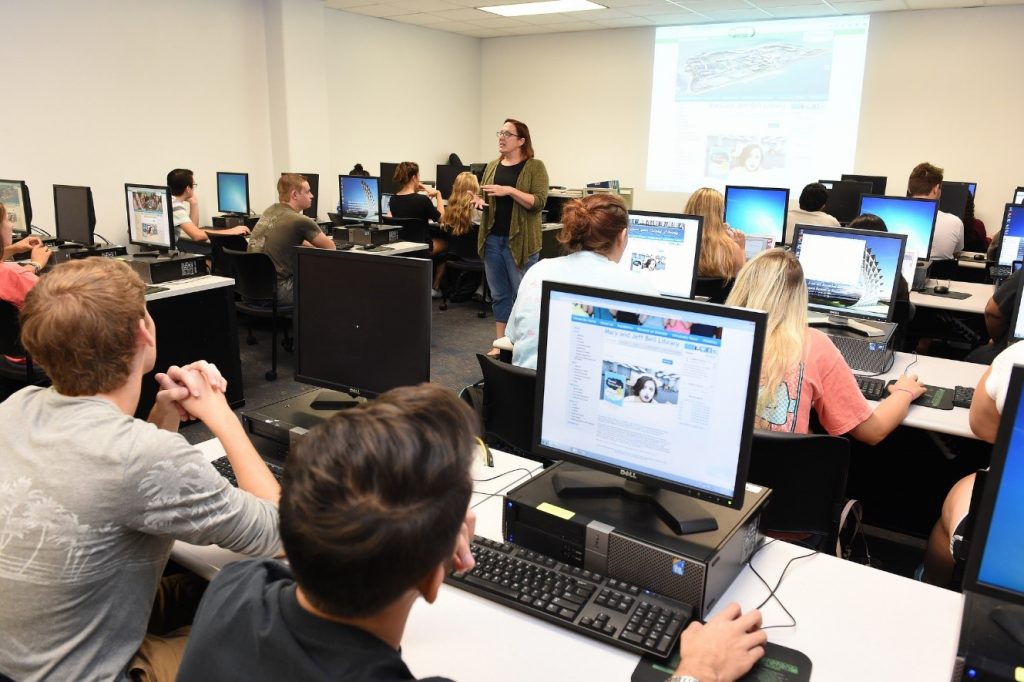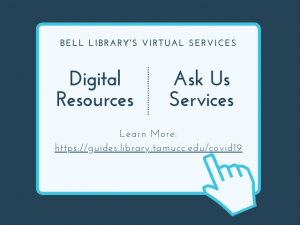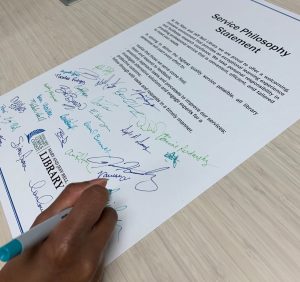Hey Faculty Friends! Have you ever seen a big group of students leaving a library computer lab and thought to yourself, “I wonder where all of those intelligent, curious, beautiful people came from?” The answer, my friend, is library instruction.
Usually when people think of library instruction they think of a 50-minute class session during which a librarian demonstrates how to use certain databases or the library catalog. While there’s not really anything wrong with this image, it’s not exactly a full picture of the process. For a while we’ve been working towards a more collaborative experience between faculty and librarians to create engaging, effective sessions revolving around well thought out objectives.
What does library instruction look like?

After filling out a library instruction request form or contacting your librarian directly, we’ll ask to see any assignments the students need to complete that the library can help with. This includes your typical research paper, but it also includes assignments where students gather data or review an article or conduct research themselves. They might be creating a website and needing free, accessible images, or they may need to create a digital exhibit. We’re happy to work with faculty on any assignments we can. We love getting to see what students are doing and how professors are working within their disciplines.
Then, we’ll usually ask to meet with you and decide on a learning objective or two. When we have an objective, we can decide what to cover, how students will need to prep for the session, and whether or not we need to schedule more than one session to meet our goals. If we can, we’ll aim to include some active learning components in the class so students don’t just sit and stare at us for an hour (this makes us uncomfortable. Librarians are skittish creatures). If it’s useful, we might create a Research Guide to accompany the class and guide students back to relevant resources.
When we finally get around to teaching the class, we’ll ask you to be present for the whole session and stay engaged. When professors chime in and contribute to the conversation, students tend to stay more focused. At the end of the session, we’ll usually ask your students to fill out an evaluation of us so we can see if we were engaging and relevant. This way we can make adjustments and become better instructors.
What can librarians do for my students?
We can of course do a demonstration of a database for you and your class. We’ve done it before and we’ll do it again. But before you decide, think about some of these alternatives and whether they might better suit your students’ needs.
Librarians can work with you to do the following:
- Examine an inherited assignment to determine what students will need to do and how a library session might help
- Tweak an assignment so that it incorporates information literacy concepts and practices
- Create objectives and an engaging lesson plan taught by either yourself or a librarian that focuses on information literacy and/or research skills
- Create a plan of scaffolded instruction taught in either the library or the classroom to help students build off of existing knowledge
- Identify tutorials and videos for students to engage with before coming to a library session or to class so they arrive armed with an introduction to a concept like keyword searching or scholarship as a conversation
- Build a Research Guide to guide students through the research process or through a particular assignment
- Create meaningful activities that teach the learning objectives rather than a simple demonstration
So when your syllabus says “library day,” set up a meeting with your librarian! Maybe you’ll come out of the meeting thinking a database demonstration is best, but maybe you’ll have created a new activity that you can carry with you throughout your teaching practice. At the very least, you’ll leave with a new friend in the library.


